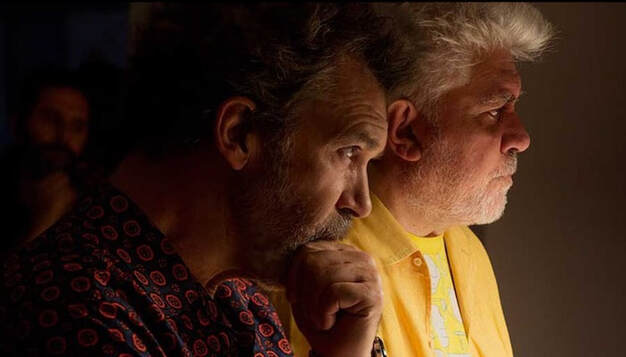|
Pedro Almodóvar Explores the Pain & Glory of a Filmmaker’s Past & Present The maestro of Spanish cinema, Pedro Almodóvar, known for quirky characters, bold themes and daring aesthetics, delivers a quieter more sublime story in his latest film of memory and loss. “Pain and Glory” focuses on his film alter ego, aging film director Salvador Mallo, as he navigates his past and possibly non-existent future. He obsessively grapples with the loss of inspiration and a body riddled with pain due to multiple medical issues. Mallo, played brilliantly by Antonio Banderas, hits a career milestone as he enters the 40 year anniversary as a filmmaker. Unfortunately, it’s not a celebratory time for the director who seems to have come to a halt in his creativity and loss of appetite for life. As such, he reaches out to Alberto Crespo (Asier Etxeandia), a lead actor from a project some 20 years earlier, with an infamous reputation for drug use- on and off the set. Their relationship during the movie production was fraught with tension and resentment, leaving them parting on bad terms never to re-connect until now. “Pain and Glory” begins at their reunion, and although rocky at first, they soon forgive and forget and offer up an unhealthy partnership. While going down memory lane, Mallo, who’s always lived a drug-free life, asks Crespo to share his habit. Crespo obliges, but has a request of his own: To access Mallo’s neglected recent writings to make into a one-man show of his own. The film takes place over a brief period of time, but in it, Almodóvar journeys the audience from Mallo’s boyhood past to the present. As a boy born to poor parents in the countryside, the prominent figure in his life was his strict, yet loving and ever-present mother portrayed soulfully by Penelope Cruz. The other key childhood character in Mallo’s life was a local teen handyman. His mother bartered her son’s tutorial skills for the handyman’s work around their house. Young Mallo was content with this arrangement and happy to attend the local school, but his world was shaken when his mom insisted he take advantage of a free education at an all-boys Catholic boarding school. “Pain and Glory” is a personal, sad and poignant story that is, as always for an Almodovar film, shot beautifully with rich, vibrant tones, including the protagonist’s art-filled apartment. There is a visual bonus with a unique tech-type segment showcasing Mallo’s maladies. Just like Almodóvar found a creative and entertaining way to portray a questionable sexual encounter (rape) in “Talk to Her,” the medical segment here, is as visually inventive. The real standout of this film though is Banderas himself. This may be one of the best roles of his career, if not the best. His portrayal is subtle, yet complex, but that in itself is not enough to elevate the overall movie to masterpiece level as some are calling it. It is achingly too small, underwhelming and lacking energy. The script, penned by Almodóvar, doesn’t go deep enough to be considered either a great character study, nor a strong situational drama. While this is a laudable minor film worth seeing, in a pantheon of many great projects and at least two masterpieces (“All About My Mother” and “Talk to Her”), “Pain and Glory” for Almodóvar does not rise to the level of what 8 1/2 was for Fellini. Maybe like Mallo, the highly acclaimed Spanish filmmaker has lost his footing a bit. Despair not, for he is still young at heart with much more greatness to be tapped into. Director: Pedro Almodóvar Writer: Pedro Almodóvar Stars: Antonio Bandares, Asier Etxeandia, Penelope Cruz MPAA Rating: R Country: Spain Language: Spanish Run Time: 113 min
0 Comments
Leave a Reply. |
AuthorPaula Farmer. Archives
June 2024
Film |

 RSS Feed
RSS Feed